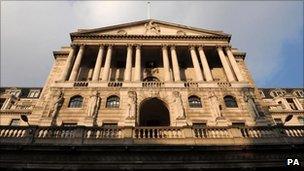Should bank reform be accelerated?
- Published
- comments

In nominating Lagarde for the IMF job the chancellor praised her 'real international leadership'
Christine Lagarde appears to have been wooed and won by George Osborne, metaphorically speaking - in that the Treasury does not expect any criticism of its deficit reduction programme from the managing director of the IMF when she visits London later this week.
This may come as something of a surprise to many, and perhaps as a shock to the shadow chancellor, Ed Balls, in that Ms Lagarde has been warning about the threat of a return to global recession from simultaneous spending cuts and tax rises in those developed economies burdened by huge debts - and urged some delay to squeezes on public-sector deficits.
But Treasury sources expect no criticism from her of the UK or of Mr Osborne - who, as it happens, was the first finance minister to nominate her for the IMF job. Apparently, she will make that clear.
Mr Osborne's case for not U-turning, made last night in a speech to Lloyd's of London's swanky annual dinner, is this:
"For an economy with a financial sector as big as ours, the potential for negative feedback loops from sovereign risk to financial risk and back again makes fiscal credibility even more vital... With a banking system whose balance sheet is some 500% of our GDP we have to make sure that our banks are successful but safe".
As I've pointed out here countless times, big banks are perceived by their creditors to be only as safe and secure as the governments that stand behind them: so if the creditworthiness of entire economies is being questioned by investors, as has been the case in Ireland, Portugal, Greece, Spain and Italy, those investors will also be nervous about lending to the banks of those financially overstretched countries (and are indeed nervous about doing so).
'The British dilemma'
Mr Osborne's fear is that if investors were to sense that the UK's public finances were spiralling out of control, that would lead to a run on our enormous banks - which he would be powerless this time to prevent as a direct consequence of that weakening in the state's balance sheet.
It is what he calls "the British dilemma" - or, as he puts it, "how to sustain a world beating international financial sector without putting our economy or our taxpayers at unacceptable risk".
For Mr Osborne, therefore, there are two imperatives: reduce the public-sector deficit, to prevent a UK sovereign debt crisis that could be amplified into a banking crisis; and break the umbilical link between state and big banks.
To put it another way, it is disastrous for the UK to have huge banks that periodically crash and are able to hold all taxpayers to ransom.
So if the UK is going through the significant pain of shrinking public services and lifting taxes to minimise the risk of our big banks bankrupting us, that risk of the big banks bankrupting us has to be significantly reduced - or so Mr Osborne argues.
Which is why he created the Independent Commission on Banking, which delivers its final recommendations to him on Monday.
Breaking up banks
And here is where something of a contradiction appears to have emerged in government policy.
While I was on holiday, Downing Street was briefing that the central proposal of the banking commission, to impose a firewall between investment banking and retail banking, would be delayed in its implementation and possibly weakened.

A Bank of England economist argues that it should be easier for banks to lend in hard times
Now, the point of that firewall, which was recommended by the commission in its interim report, is to reduce our banks' dependence on the implicit support of taxpayers.
The idea is that big banks should be able to go bust, with the costs falling on their owners and creditors, rather than on the public purse.
In other words, the firewall proposal seems precisely what Mr Osborne wanted - and he confirmed as much at the Mansion House dinner earlier this year.
But, as you'll understand, as and when banks become genuinely independent of the state as proper commercial organisations, the risks of lending to them increase.
And when it becomes harder and more expensive for banks to borrow, they push up the interest rates they charge you and me when we borrow - and they also ration credit.
Understandably, with the British economy struggling to grow, the prime minister is worried about reforms that could choke off the supply of loans.
Which is why Mr Cameron's people have been briefing that he won't allow reforms that risk tipping the UK back into recession.
Mr Osborne last night gave a nod that he might agree with Mr Cameron, by lauding a paper recently written by the influential Bank of England economist, Andy Haldane, external, which argues that macro-prudential policy should be symmetrical (I'll translate: the Bank of England should make it harder for banks to lend in unsustainable booms, and easier for them to lend when the economy is weak).
But if the living standards of more or less every British person is being squeezed to prevent another banking crisis, delaying reform of the banks would seem slightly odd - especially if delay were to turn into cancellation of the reform.
The big question for the Treasury, therefore, is whether there is a way of implementing the separation of investment banking and retail banking, while maintaining or indeed increasing the flow of credit to small businesses and households.
Less profitable
Now there is an argument that if Britain's banks were forced to manage their retail operations as segregated, independent operations, there would be - per contra to the Downing Street view - a significant increase in the availability of loans for two vital segments of the economy, consumers and companies that are too small to borrow directly from investors on markets.
Here's why: separation of retail banking and investment banking, which effectively removes the subsidy from investment banking, would make investment banking significantly less profitable.
Which means there would be a big new incentive for banks to deploy more of their capital in retail banking, or the operation perceived as more vital to our prosperity.
On that logic, which is not disputed by officials, the Treasury would be advised to do the reverse of what Mr Cameron appears to want.
It would speed up the implementation of the banking firewall - and find some way of minimising any transitional impact on the overall availability and cost of funds.